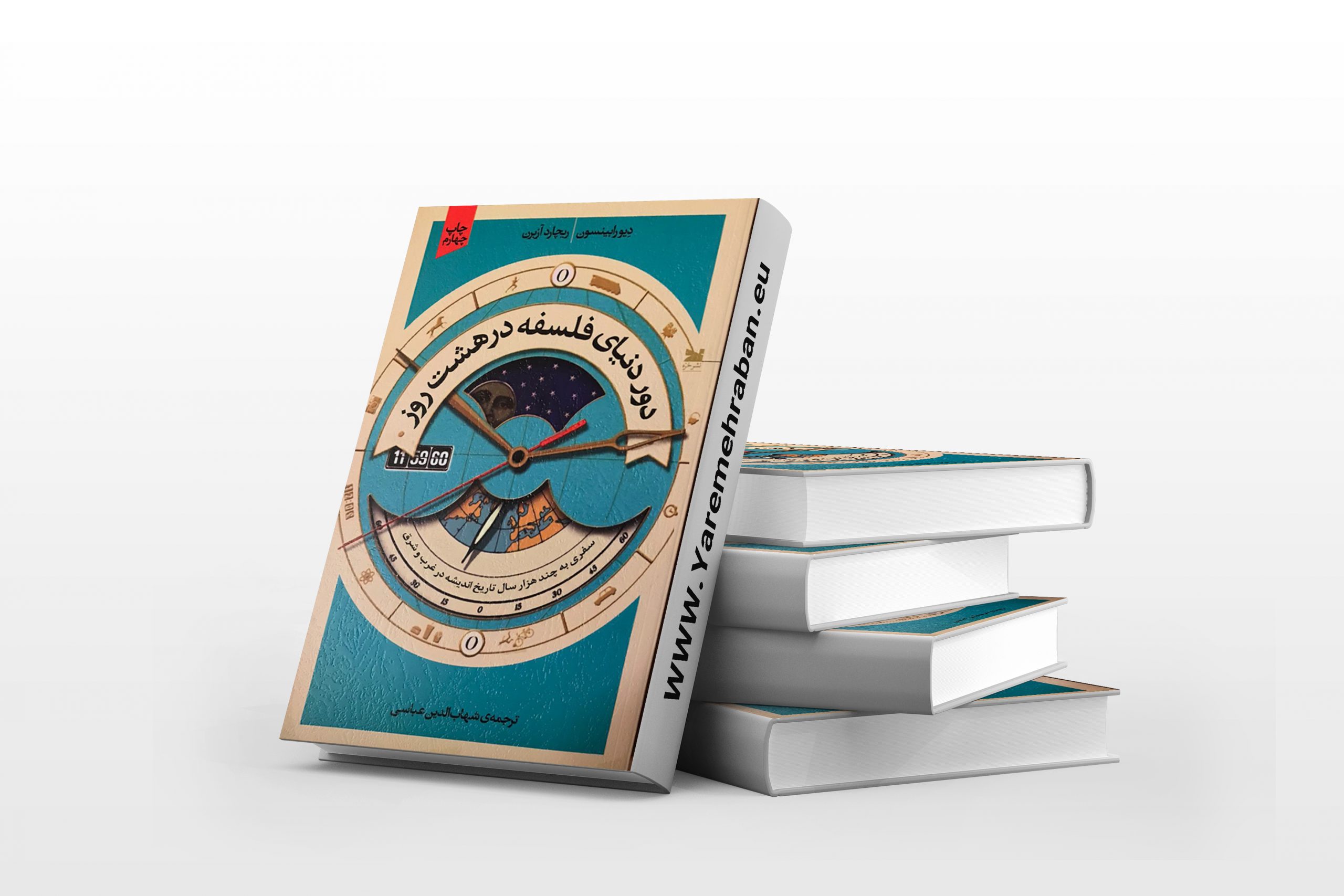Description
In the book “Introducing Ancient Eastern Philosophy”, in addition to getting acquainted with philosophers and the history of philosophy in the West and the East, we see a “general picture” of human philosophical journey in front of us, like one who sees the sea in a general view. Traveling around the world of philosophy is as exciting as traveling around the world of Jules Verne;
We start from a point and on a long journey, we go to “different places” and return to the starting point of our journey. But in the words of the poet TS Elliott, in this case we see our starting point “differently,” as one who, in Plato’s words, “practices philosophy without deceit.”
Introducing the book Around the World of Philosophy in Eight Days
“Around the World of Philosophy in Eight Days” seeks to make such a journey possible. With “Around the World of Philosophy in Eight Days”, we have for the first time a short book that introduces us to 3000 years of history of philosophy in the West and the East.
The present book is a translation of two books from a new and widely read collection published by Aiken Publications.
Philosophy, as Will Durant puts it in his book Invitation to Philosophy, does not fill our wallets and take us to higher levels of government. Because if we have a quality full of money and reach the highest positions, but with all this, we remain raw and ignorant and have an ugly mind and an unstable personality and disturbed desires, what good is that money and position?
But perhaps philosophy, if we are faithful to it, will give us a healing spiritual unity. Disciplinary philosophy is a person who makes us grow and gives us divine freedom and purity. Knowledge is power, but only wisdom is freedom.
Around the world of philosophy in eight days:
Reading books is also a kind of journey, another exciting journey in which you can go to the most real and imaginative journeys at the lowest cost and experience worlds that are not possible to see in the real world, some of these journeys can not be done with all the conditions. Experience in the real world, but you can easily leave the corner of the house and rest without packing your bags and getting a visa and… their way.
The book we are talking about is supposed to take you on a strange journey in eight days, and when you return from it, you will have a whole new experience.
In “Around the World of Philosophy in Eight Days”, in addition to getting acquainted with philosophers and the history of philosophy in the West and the East, we see a general picture of human philosophical course in front of us. Do not worry at all, a simple and understandable text in front of you, not a heavy and philosophical book that will stop you from continuing the journey and take you home!
The book “Around the World of Philosophy in Eight Days” with the subtitle “Journey to several thousand years of the history of thought in the West and the East” divides the history of philosophy into two geographies of the East and the West of the world. This book includes translations of two separate books from a collection published by Aiken Publications
“History of Western Philosophy” by Dave Robinson and “History of Eastern Philosophy” by Richard Osborne. The book was translated and published by Shahabuddin Abbasi and published by Khazeh. Recently, Samava presented it with the reading of Sam Gharibian so that you can take this extraordinary journey with another voice. Let’s go to the book and see what its content is and how the factors involved in its production have presented it, both in the form of a written work and an audio work.

Introducing the book Around the World of Philosophy
“Around the World of Philosophy in Eight Days” is written for audiences who are interested in philosophy, but its lavish title can take them away from it. The authors have written it in two parts of the history of Western and Eastern philosophy, so that by studying it, one can travel to the Western world and its formation in Greece, and travel to the East, and encounter its philosophy, which the audience is less familiar with.
The History of Western Philosophy begins with the definition of philosophy and the description of philosophizing by the ancient Greeks and Egyptians and ends with an explanation of the ideas of structuralists and postmodernists.
In the history section of Eastern philosophy, it begins with the definition of this type of philosophy and its original features, which, after a historical tour of the schools of thought and rituals of Indians, Chinese and Japanese, finally reaches the contemporary time and description of Marxist Maoism. The special feature of the book is that it presents the philosophy of the two worlds, the West and the East, while in the existing books, the two are basically not together and each is a separate book.
About Dave Robinson, author of Around the World in Felt in Eight Days
Dave Robinson, who wrote the History of Western Philosophy section, is British, and generally writes popular nonfiction books, and Richard Osborne writes The History of Eastern Philosophy.
The two authors have collaborated extensively, but each has its own philosophical studies. Robinson in Western philosophy and Osborne in Eastern philosophy and mysticism.
In a part of the book Around the World of Philosophy in eight days we read:
Perhaps we can better understand postmodern philosophy by formulating it through the three great “ifs.” If we can no longer know human thoughts with certainty and certainty of ourselves, if the language we think with can not meaningfully refer to the world outside of itself, if the meaning of independent linguistic signs is constantly changing, then philosophy, logic and science itself They are facing very bad news.
The key to understanding postmodern skepticism is: the issue of language, or rather the notion of meaning. (Nietzsche, the illusion of truth)
Arguments for the skepticism of postmodernism have always existed within Western philosophy, even since the time of Cralitus, who refused to speak because he believed that the meanings of the words he used were unstable and variable. Nietzsche is the later and better known founder of postmodernism. He emphasized that language could only be metaphorical and that was it.
Index of the book
Introduction
Introduction
History of Western Philosophy, Dave Robinson / Chapter One: Questions That Do Not Leave Us
Chapter Two: Anselm Argument
Chapter Three: Government and the End of History
Chapter 4: An Introduction to Twentieth Century Philosophy
Chapter Five: The Three Great Postmodernism / History of Eastern Philosophy, by Richard Osborne
Chapter Six: The Upanishads
Chapter 7: The Expansion of Buddhism from India
Chapter 8: Buddhism in China
1- Introducing the book Introducing Ancient Eastern Philosophy on YouTube
2- Introducing the book Introducing Ancient Eastern Philosophy in Aparat














Reviews
There are no reviews yet.